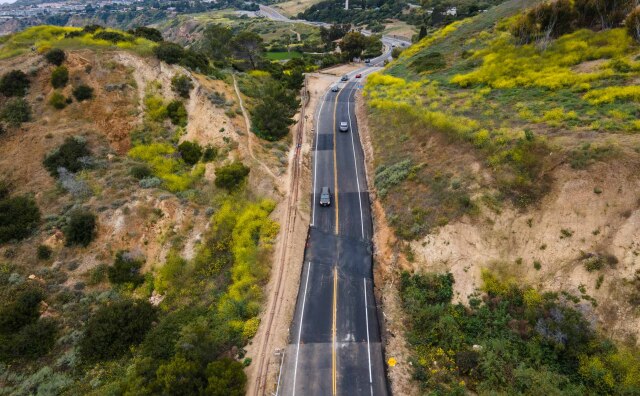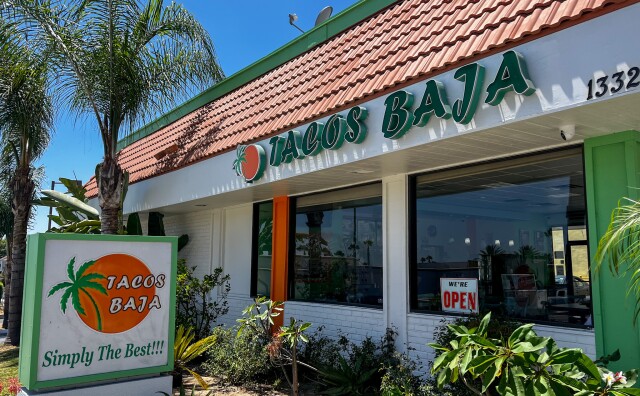-
Climate change is affecting our food, and our food is affecting the climate. LAist, together with NPR is dedicating a week to stories and conversations about the search for solutions.
How many ways can you cook an onion? Sure, you can chop and saute it… but how about roasting its skin until it turns black and then pulverizing it until it turns into a powder to be used as a seasoning?
That kind of thinking has led Lauren and Phil Pretty, the brother-and-sister owners of Heritage in Long Beach, to earn a Michelin Green Star for sustainable practices two years in a row, one of just 291 restaurants across the globe.
In the U.S., we throw away more than 30% of the food we buy, which translates into roughly 92 billion pounds of waste, according to the U.S. Department of Agriculture. Much of that ends up in landfills, producing significant amounts of greenhouse gases and exacerbating the climate emergency.
A good chunk of that waste comes from restaurants. This is why the efforts of a new crop of chefs and cooks, like the Pretty siblings, remain so essential to the future of fine dining.
The zero-waste philosophy
Heritage is small restaurant housed in a craftsman-style home on 7th Street, one of Long Beach’s busiest thoroughfares. It has a quaint yet upscale feel, with a sleek modernist kitchen and dining area, feeling like you are in someone's dining room.

The Prettys, who grew up in Long Beach, base their kitchen on zero-waste principles. This means everything — from food to packaging — should be used, and nothing should be thrown away.
According to Phil Pretty, who’s been cooking professionally for 20 years, it’s all about creativity.

“We're taking one ingredient and manipulating it four to five different ways rather than having five different ingredients,” he said.
It’s allowed him and his team to evolve in their abilities as cooks. “We can now rely on less is more," he said. "There are generally only three things on the plate. But within those three things, there's a lot of depth in how we work and how it gets to the plate.”
What does zero waste look like on the plate?
Using a tasting menu model, which runs $150 a person, gives the duo a certain level of control.
Pretty uses the example of a recent shipment of a pork set, which typically contains an array of cuts of meat. Part of that set goes towards their pork shoulder dish, which is roasted whole to ensure they don’t waste excess meat.
This is followed by pork belly that’s cured and smoked.
Then, a batch of onions is chopped to make jam with the pork belly. A second batch of onions is cut in half and cooked using the sous vide method (immersion cooking), causing them to curve into themselves. Those act as casings, which are then stuffed with the jam.
The remainder of the onion pieces, the middle parts of the vegetable, are then cooked down with cream and blended to create a soubise, a classic French sauce used as a base for the rest of the dish.
That kind of inventive thinking plays into Heritage's bottom line. The average cost percentage for a fine-dining restaurant is usually around 35% of its overhead. However, food costs at Heritage “hover around 28-30%, well below the average,” Phil Pretty said.
Betting the farm
Heritage's sustainable footprint goes far beyond the restaurant. The Prettys also founded Heritage Farm, a small plot of land up the street from the restaurant. The land is used primarily for growing herbs in large quantities for the kitchen, along with a few spaces for seasonal crops such as 1,500-year-old cave beans, an heirloom bean native to the southwest of the U.S., and tomatoes, passion fruit, and figs.
“We just planted a third fig tree, so we now have fig leaf ice cream on the menu. We'll use all the leaves first, then the figs will come into season, and then we'll start using the figs as well,” Lauren Pretty said.
For the siblings, working toward sustainability also means supporting the local economy.
“I like to keep the money in the city as much as possible, and I like to keep the money in the family as much as possible,” Phil Pretty said. “Our goal was always to cut out the middleman in any way, shape, or form.” They’ve hired a full-time driver (Lauren’s husband Thomas) who visits the local farmers’ markets and does local runs to cheesemonger Oh La Vache, along with another local dairy purveyor.
Creating a local supply chain means the restaurant isn’t dependent on larger suppliers, who often use huge semi-trucks to deliver their products. That’s the norm for many restaurants in the U.S. and leaves a significant carbon footprint, from exhaust fumes to a constant supply of single-use packaging.
Making cents
However, the zero-waste kitchen is only one aspect of how Heritage earned its Green Star. Shortly after opening, the city of Long Beach asked if Heritage was interested in participating in the Green Business Network program, which involves steps to help Heritage become Green Business Certified. The certification process is granted after following a series of recommendations from an outside consultant.
Lauren Pretty said she started with an office at the restaurant, properly sorting the trash using two trash cans, one for recycling and one for landfill, and has become even more skilled since then.
From an operations perspective, she said, she looks at everything from on-site paper products to printer paper, toilet paper, and paper towels. The same goes for cleaning products used, such as soaps and cleaning products, using hydrogen peroxide instead of bleach.
“You have to use chemicals to clean the restaurant. We're just making sure that we're making good choices when it comes to products like that,” she explained.
Ultimately, “it’s about taking the time to make small changes that don't cost anything to make your business more environmentally friendly,” she said.
LAist takes the climate emergency seriously. And our coverage is unique because we took the time to listen to Southern Californians about their concerns. With more climate coverage than ever before, we are here for you every single day with stories that provide actionable information so you can make your everyday life better.
But we cannot do this essential work without your help. We rely on donations from readers like you to stay independent, which keeps our nonprofit newsroom strong and accountable to you.
At a time when the need for local journalism has never been greater, many newsrooms are facing cutbacks, including LAist. Member support – your support – is what will sustain a free press in Southern California.
LAist’s mission is to be here for you, so please be here for us now with a donation to power our trusted local reporting. Step up right now and make the choice to give. Because that’s exactly what it is - a choice. But it is not a choice without consequences. If readers do not choose to step up and donate, the future of fact-based news in Southern California will not be as strong.
No matter what happens in the world, LAist will remain a voice you know and trust.
Thank you for your generous support.
Sincerely,
-
(she/her)



















